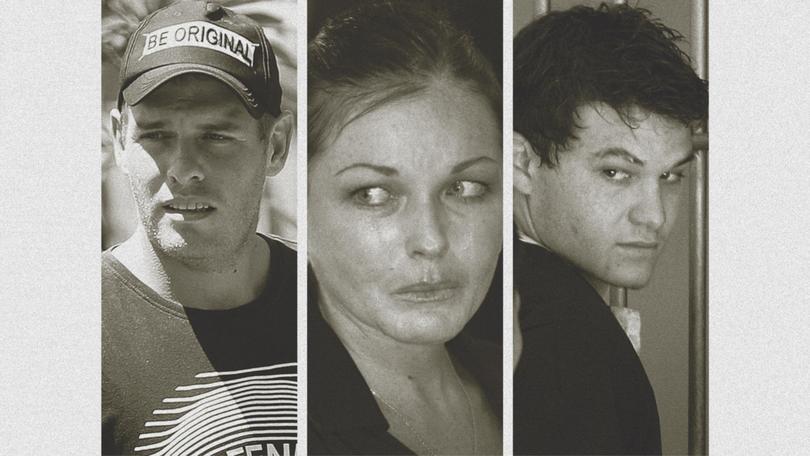Bali Nine: Legal experts say deal to bring remaining Aussie prisoners home would be a legal minefield
Bringing home the remaining Australians convicted in 2005 would either require a ‘bespoke’ agreement between Indonesia and Australia, or revisiting a scrapped deal that fell apart almost 20 years ago.

Any potential deal to bring home the remaining Bali Nine will be a legal minefield that would either require Indonesia and Australia to sign a “bespoke” agreement, or revisit a scrapped deal that fell apart almost 20 years ago, a legal expert says.
Nineteen years after nine young Australians were caught attempting to smuggle 8kg of heroin to Australia, Home Affairs Minister Tony Burke was set to use a meeting with Indonesia’s law minister on Tuesday to discuss bringing the five who remain behind bars – Matthew Norman, Si-Yi Chen, Scott Rush, Michael Czugaj and Martin Stephens – home.
Indonesia’s coordinating minister for law, human rights, immigration and corrections Yusril Ihza Mahendra last week said the President had “approved the steps to settle the matter”, after Prime Minister Anthony Albanese asked Prabowo Subianto to agree to the transfer during a meeting last month.
Sign up to The Nightly's newsletters.
Get the first look at the digital newspaper, curated daily stories and breaking headlines delivered to your inbox.
By continuing you agree to our Terms and Privacy Policy.Indonesia wants reciprocation, and Mr Mahendra said he was optimistic the transfer could be wrapped up by the end of the year.
He said while it was preferable the five men would continue serving out their sentences if they returned home, clemency would ultimately be a matter for Australia.
“We are transferring them to their countries so they can serve their sentence there, but if the countries want to give amnesty, we respect it. It’s their right.,” he said last week.
Mr Burke and the Government have been reluctant to comment on the details out of fear of jeopardising a precarious diplomatic effort.
“I’m very respectful and grateful that they want to be able to have that conversation, and I’ll be approaching that conversation with a good deal of humility and listening to where the Indonesian Government’s up to,” Mr Burke said on Sunday.
The request for reciprocation, and Indonesia’s reluctance to grant the men clemency or commute their sentences makes bringing them home a legal challenge, international law expert Donald Rothwell said.
“The only way they could be returned is under a legal framework, which would require the negotiation of a prisoner transfer agreement,” the ANU professor said.
“There is a possible workaround, which is to agree upon a memorandum of understanding. It’s less formal and a more political instrument that could be drafted that provides for a bespoke set of arrangements that deal with the particular circumstances.”
He said the only other time Australia has entered into such a one-off agreement was to bring home accused terror supporter David Hicks from Guantanamo Bay in 2007, after he pleaded guilty in a military court.
He was transferred to Australia and served the remaining months of his seven-year sentence in a South Australia prison - before his conviction was later overturned by a US court.
“The Howard Government was very keen to get the Hicks matter resolved and to get Hicks repatriated to Australia for political reasons, and so a bespoke arrangement was done to quickly facilitate his return,” professor Rothwell said.
There remains the option of agreeing to a more formal, bilateral prisoner transfer agreement. Australia and Indonesia were close to signing a deal almost 20 years ago, shortly after the Bali Nine and Shapelle Corby were convicted of their drug crimes in Indonesia.
The deal at the time would have unlikely applied to Bali Nine ringleaders Andrew Chan and Myuran Sukumaran, who were ultimately executed in April 2015.
The eighth member, Tan Duc Thanh Nguyen died from cancer in 2018, the same year the only woman in the group Renae Lawrence was released.
But the deal never eventuated, and professor Rothwell said that was in part because Indonesia at the time had been unwilling to include Australians convicted of drug offences in the agreement.
Given the bulk of Australians convicted in Indonesia are on drug offences, Australia “took the view that won’t serve our interests”.
But the new President, who only came to power in October, could be trying to “clear the decks” and ensure a fresh diplomatic edge to deal with partners like Australia.
“The new President may be willing to move on this, and there may well be the potential to negotiate a more permanent treaty,” professor Rothwell said.
“But a more permanent treaty in normal course of events would take six to 12 months to be negotiated and come into force. That’s a longer process that isn’t consistent with the timelines the Indonesians are suggesting.”
Andreas Harsono, an Indonesian researcher for Human Rights Watch, said President Prabowo also had a “personal interest” in people on death row, having himself helped secure the 2015 release of Indonesian woman Wilfrida Soik who had been sentenced to death in Malaysia.
Mr Harsono said almost ten years on, the President remained personally and politically interested in Indonesians facing maximum sentences.
“He has a personal interest in helping Indonesians overseas on death sentences, and to do that he has to be fair to foreigners sentenced to death or life in prison in Indonesia,” Mr Harsono said.
France has formally requested the repatriation of a man on death row in Indonesia for drug offences, while Jakarta granted amnesty last month to Filipino woman Mary Jane Veloso - 14 years after she was sentenced to death.

